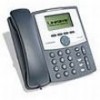Linksys SPA922 Cisco SPA9000 Voice System Administration Guide - Page 35
SPA9000 Ethernet Port, LAN and Application Guidelines
 |
UPC - 745883570836
View all Linksys SPA922 manuals
Add to My Manuals
Save this manual to your list of manuals |
Page 35 highlights
Basic Administration of the SPA9000 Configuring Basic Settings 2 SPA9000 Ethernet Port The SPA9000 Ethernet port is used to connect an administrative computer. Typically, this port is used only during initial installation and configuration. With WAN access enabled by default, you can manage your SPA9000 from any computer that is connected to the same subnetwork as the SPA9000. The default IP address for this port is 192.168.0.1. LAN and Application Guidelines Although the SPA9000 can provide router and application services, it does not have sufficient power to provide both phone and routing/application services in a highly utilized environment. For this reason, Linksys recommends that the SPA9000 not be used as a router at any time. Instead, use the SPA9000 as an appliance by connecting its INTERNET port to a network switch and leaving the ETHERNET port disconnected. It is recommended that you leave the LAN and Application settings at the default values. Configuring Multicast Addressing and Group Paging For initialization and system updates, the SPA9000 communicates with all the client stations at once by using IP multicast. This method also is used in the group paging application. For this reason, the SPA9000 and the SPA9xx IP phones must reside on a network where multicasting is allowed. Default addresses are provided, but you can change these addresses as needed. NOTE Make sure that the SPA9000 and the SPA900 Series phones use the same multicast address and port number. Also make sure that you enable spanning tree and port fast on your LAN switch, as described in the SPA9000 Voice System Installation and Configuration Guide. SPA9000 Voice System Administration Guide 33















